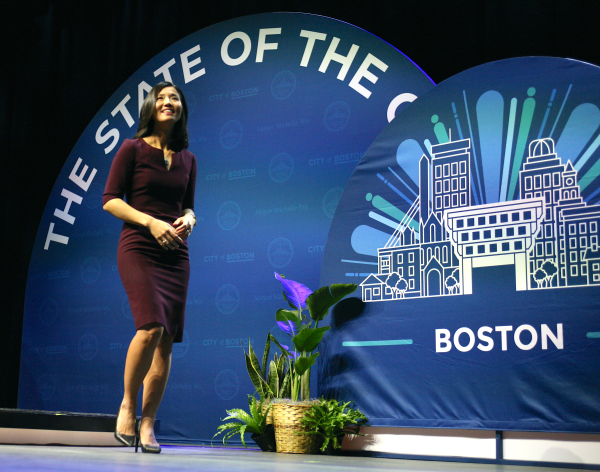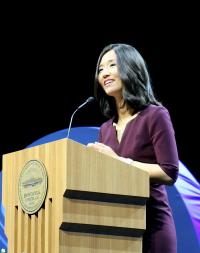January 10, 2024

Mayor Wu took the stage at the MGM Music Hall on Tuesday evening. Seth Daniel photo

Boston Mayor Michelle Wu began her 2024 State of the City address Tuesday night by basking in the glow of last month’s parade for the national Pop Warner football champions, the Dorchester Elite Eagles, and the Boston Lady Raiders cheerleaders—a celebration that followed 18 years of disappointments. But, when it was time for the obligatory words about why the state of the city was strong, she talked about housing.
“It is thanks to the people of Boston that tonight I can say the state of our city is strong,” she said, “not because the challenges that remain are simple or small, but because they’re big and they matter and we are rising to meet them.”
Among the particular challenges mentioned by Wu: Helping a single parent in public housing become a first-time homeowner. Another particular, helping a Roxbury homeowner create an accessory first-floor unit to improve access for his 89-year-old mother, was part of a new policy that will reduce similar regulatory hurdles citywide.
Former Councillor Matt O’Malley, Kevin Hagerty, president of Vicinity, Councillor Ed Flynn, State Veterans Affairs Secretary Jon Santiago, and UMass Boston Chancellor Marcelo Suárez-Orozco. Seth Daniel photos
In a statement before the speech, the move on accessory dwelling units (ADUs) was praised by Jesse Kanson-Benanav, executive director of Abundant Housing Massachusetts, who said, “Our city has an extreme shortage of affordable homes, and this action will help ensure the city has all the tools at its disposal necessary to tackle this crisis. ADUs are a gentle way to add more homes to our neighborhoods, while ensuring that families stay together by providing housing for grandparents, recent graduates, or loved ones with disabilities.”
On a larger scale, Wu promised to help keep rents affordable for another 400 families by using community housing trusts, which could prevent sales of their buildings to investors. Other moves that could affect housing supply include what the mayor called “the first comprehensive rezoning in decades,” along with a streamlining of zoning restrictions around major streets and squares. An even larger goal was to create almost 3,000 new public housing units over the next decade, which would allow Boston to take advantage of additional federal funding.
In a statement before the address, Salima Vo, Vietnamese Outreach Coordinator of the Asian American Resource Workshop, expressed support for the additional housing. “There is not enough public housing to meet the demand we see every day in our work with low-income families and seniors, who otherwise are at risk of getting rapidly priced out of the neighborhood while waiting years for a public housing unit,” she said. “The tenants we work with are facing unsustainable rent increases and poor conditions, and they urgently need more stable and affordable housing options to stay in their community.”
Like her predecessors, Wu used the speech to talk about total housing production. Under her last elected predecessor, Marty Walsh, more than 28,000 units were built from 2014 to the end of 2020, his last full year in office. On Tuesday night, Wu used her own big metric: “Last year we permitted the highest ratio of affordable housing in over a decade and approved nearly 7,400 housing units for future development.”
According to the real estate services and investment firm CBRE, Boston’s commercial property market continued to cool through the third quarter of 2023, with more vacancies, though that same trend experienced by many US cities could take a turn for the better later this year. In Boston, Wu reported in her speech, the city has received proposals for converting eight downtown buildings into housing.
Dep. Supt. Nora Baston, Piter Brandao, Romilda Pereira, and Paul Debarros gathered for the SOTC address on Tuesday.
She noted some progress in response to concerns about public health and safety near the intersection of Mass. Ave and Cass Boulevard. “Our teams built relationships at Mass. and Cass and added more beds and services citywide,” she said. “With unprecedented coordination, we delivered unprecedented results. Today the encampments are gone, and hundreds of people are housed and on the path to recovery,”
Figures from the Boston Police Dept. show an overall drop in Part 1 crime for 2023 by almost 14 percent. Despite an increase in robberies and attempted robberies, there were a decrease in homicides and a 20 percent drop in shootings, with all crime figures below the city’s five-year average.
Wu did not mention the long-term plan that envisioned the closing of as many as half the city’s public schools, nor did she address the strong opposition to her plan that would move the John D. O’Bryant School of Math and Science from its current site in Roxbury to West Roxbury. But she did announce multiple partnerships between public schools, community colleges, and Mass General Brigham. And, under an agreement announced in the speech, the Boston Community Leadership Academy 7-12 Pilot School in Dorchester’s Columbia Point will join with UMass Boston to become the district’s first university assisted “community hub school.”
Said the mayor: “Together we’ll give our high school students direct access to college coursework and resources, partner educators from both institutions, and create a seamless pathway into UMass Boston for our graduates as we renovate a state-of-the-art high school campus embedded in the Columbia Point community.”
That move was hailed after the speech by state Sen. Nick Collins (D-South Boston/Dorchester), who said, “It’s going to set up the McCormack for success in a way we’ve been trying to achieve for a while.”
Wu also announced plans to expand other programs for children, from early education to summer work and learning opportunities, including a summer job for every BPS high school student who wants one.
Another partnership she cited is between the city and the local franchise in the National Women’s Soccer League to renovate White Stadium at Franklin Park. The plan has been greeted with concerns about access to facilities by student-athletes from the Boston Public Schools, but Wu emphasized the potential gains. “Our students will have access to a world class grass field, eight-lane track, brand new locker rooms and conditioning, and study spaces to call home,” she said. “We’ll also create a new booster fund for BPS athletics to cover expenses for uniforms, extra equipment, and dedicated transportation.”
Wu also mentioned that the city would act on recommendations for the restoration of Franklin Park and start a community process to imagine and locate a new home for the Elma Lewis Playhouse. As to the park itself, it will have its own administrator and dedicated staffing at what the mayor said would be the highest level in more than fifty years.
Toward the end of her speech, Wu brought up her experience as a child being taken by her mother to an art museum on regular days of free admission. She enlarged on the particular by announcing a new program in Boston that will allow free admission on the first and second Sundays of each month for Boston Public School students and family members at the Museum of Fine Arts, the Children’s Museum, the Institute of Contemporary Art, the Museum of Science, the New England Aquarium, and the Franklin Park Zoo.
“The institutional partnerships will make a difference,” said Sen. Collins. “It makes them less intimidating. I went to Boston Latin in the 7-12-grade model, and the Museum of Fine Arts was an intimidating institution for me.”
Reacting after the address, City Council President Ruthzee Louijeune wrote, “It was a really good speech, addressing our persistent housing issues by deeper investments to prevent displacement, continued focus on our schools to ensure the sky is the limit for our kids and their families, and making the vibrancy of our city accessible to everyone with free access to some of our most beloved institutions. I’m hopeful.”
In a speech that began—over shouts of protestors—with memories of a parade and reached a crescendo over housing, the destination was home—more precisely, a definition of feeling at home in a city. “Because” as Wu explained, “home is so much more than a house, though it’s a good start at a park down the street for kids to run around in, and a unit below so grandma can live close. Make it a place where you can put roots knowing they’ll blossom, surrounded with schools that inspire and connect. Open the doors wide to give your community the world. When your neighbors win big, throw a parade. Home is all the little points of light that give tomorrow its glow. It’s the place and the people you refuse to give up on.”



